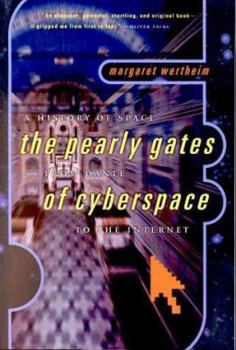A History of Space: The Pearly Gates from Dante of Cyberspace to the Internet
Select Format
Select Condition 
Book Overview
But as science commentator Margaret Wertheim argues in this marvelously provocative (Kirkus Reviews) book, cyberspace has in recent years become a repository for immense spiritual yearning. Wertheim explores the mapping of spiritual desire onto digitized space and suggests that the modem today has become a metaphysical escape-hatch from a materialism that many people find increasingly dissatisfying. Cyberspace opens up a collective space beyond the...
Format:Paperback
Language:English
ISBN:0393320537
ISBN13:9780393320534
Release Date:May 2000
Publisher:W. W. Norton & Company
Length:336 Pages
Weight:0.92 lbs.
Dimensions:0.8" x 5.5" x 8.2"
Customer Reviews
5 ratings
Virtual Religion
Published by Thriftbooks.com User , 20 years ago
virtual connections to the holy space traced in this historic survey is an interesting perspective worth reading.
Very good
Published by Thriftbooks.com User , 25 years ago
This book offers a very introduction and explanation to the concept of space and links both historic and present situations in a perfect way. If you're interested in either philosophy, the internet, history, religion or all of that together, then read the book !
Fascinating but breathless look at our conception of space,
Published by Thriftbooks.com User , 25 years ago
The ground that this book is trying to cover is certainly expansive, and it's no wonder that some of the topic areas get short shrift. The initial chapters on our conceptions of space are fantastic: I was aware of how our conceptions have changed from absolute space to relativistic and beyond, but Wertheim did an excellent job of demonstrating how much of this change was conceptual rather than purely a change of scientific theory. More importantly, she shows how these changes affect our world-view and spiritual beliefs, and how these affect science and art in turn. For example, she argues that the flat & "unreal" nature of early religious paintings is a reflection of the idea of heaven being outside of normal space. Thus the adoption of three-dimension perspective drawing techniques signaled a shift towards the dominance of physical space. For anyone seeking good examples of changes in scientific paradigms, this book is an excellent place to start.After recording a history of space to date, Wertheim tries to describe cyberspace as being the next significant shift in our conception of space. To most steeped in our current physicalist tradition, the concept of cyberspace as being an actual space is pretty way-out, but it does make sense in light of the previous world-views described by Wertheim. However, Wertheim characterises cyberspace as a place we enter, but in many ways it is the opposite- the projection of another space into our own. Viewed this way, the radical conclusions Wertheim makes seem rather far-fetched.Where I was most disappointed was in Wertheim's treatment of "cyber-soul-space". The idea of uploading our selves into a virtual world is an enticing one, but too many of the complicated issues of self and consciousness are given a skimpy treatment, skipped over almost breathlessly as Wertheim races towards her conclusion. Many of these issues have been dealt with extensively in other books, but I was keen to see Wertheim's particular slant, as there are many interesting parallels between these issues and some of the medieval theologies discussed earlier. Overall, I enjoyed this book, but was disappointed that the initial rigour and detail of the first half was not followed through, but this is an inherent danger of writing a book with such a wide scope.
This is an amazing book
Published by Thriftbooks.com User , 25 years ago
Forget the title - the real story here is in the subtitle "A History of Space from Dante to the Internet". That's what attracted me, and it lives up to the promise. In less than 200 pages Wertheim gives us the story of space from the middle ages to today. The medieval space of the afterlife, Renaissance perspective space, Copernicus' discovery of astronomical space, Einstein's relativistic space, and todays theories of cyberspace -- Wertheim connects the dots as if she is solving a complex historical puzzle. Even if you don't give a damn about cyberspace this is an amazing book. After reading this you will never take the word "space" for granted again. As Wertheim shows, there is a never-ending morphing of this quintessiential concept.
Wertheim's critisism of cyber-religiosity is clear/concise
Published by Thriftbooks.com User , 25 years ago
What a great book, Wertheim's critisism of cyber-religiosity is clear, concise and eviserating of cyber-gurus and those who would take cyberspace as a new home for the "soul". Wertheim puts these deluded people into their place, showing that this is quasi-religion at its most misguided. To me however, the 'meat' of the book and it's primary worth is not the discussion of cyberspace, but as a history of western conceptions of space, and subsequently how we have gotten to this end of the millenium with a purely physical vision of reality. Unlike most other commentators, Wertheim puts the science of space into a cultural context, linking it to the history of art, philosophy, literature and religion. Wonderfully done - a real gem for all those interested in how science relates to the rest of life.





